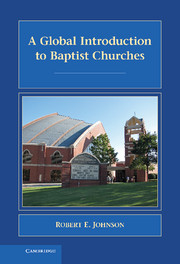Book contents
- Frontmatter
- Contents
- List of Illustrations
- Acknowledgments
- List of Important Baptist Organizations
- Global Baptist Timeline
- Introduction
- PART I FOUNDATIONS
- PART II AGE OF EMERGING BAPTIST DENOMINATIONAL TRADITIONS
- PART III THE FRONTIER AGE
- PART IV AGE OF PROLIFERATING TRADITIONING SOURCES
- PART V BELIEFS AND PRACTICES
- Index
PART I - FOUNDATIONS
Published online by Cambridge University Press: 05 September 2012
- Frontmatter
- Contents
- List of Illustrations
- Acknowledgments
- List of Important Baptist Organizations
- Global Baptist Timeline
- Introduction
- PART I FOUNDATIONS
- PART II AGE OF EMERGING BAPTIST DENOMINATIONAL TRADITIONS
- PART III THE FRONTIER AGE
- PART IV AGE OF PROLIFERATING TRADITIONING SOURCES
- PART V BELIEFS AND PRACTICES
- Index
Summary
And let no man be offended at us for that we differ from the ancient brethren of the separation in the Liturgy, Presbytery, and Treasury of the Church: for we hold not our faith at any man's pleasure or in respect of persons, neither do we bind ourselves to walk according to other men's lines further than they walk in the truth: neither let the world think that we approve them in all their practices: let them justify their proceedings or repent of them. We have (we willingly & thankfully acknowledge) received much light of truth from their writings, for which mercy we always bless our God: & for which help we always honor them in the Lord and in the truth. But as Paul withstood Peter to his face & separated from Barnabas that good man that was full of the holy ghost & of faith, for just causes: So must they give us leave to love the truth & honor the lord more than any man or Church upon earth.
John Smyth, Differences of the Churches of the Separation, 1608A BAPTIST PROFILE
In his “I Have a Dream” speech, delivered prophetically on the steps of the Lincoln Memorial in Washington, D.C., on August 28, 1963, Martin Luther King Jr. proclaimed his vision of a new reality for the world in which he suffered. He envisioned a day when “little black boys and black girls will be able to join hands with little white boys and white girls as sisters and brothers.” King was not the first to indulge such a dream, and he was not the only person in the multitude gathered that day to aspire to this new reality. The fact that his words resonated so powerfully with so many people both then and now testifies to the fact that his dream lay latent in the hearts and minds of countless people. But King, on that day, to a degree surpassing everyone before him, succeeded in giving voice to a dream that had been struggling for birth over generations. Indeed, when expanded to global proportions, this dream continues its contest for actualization.
- Type
- Chapter
- Information
- A Global Introduction to Baptist Churches , pp. 7 - 8Publisher: Cambridge University PressPrint publication year: 2010



